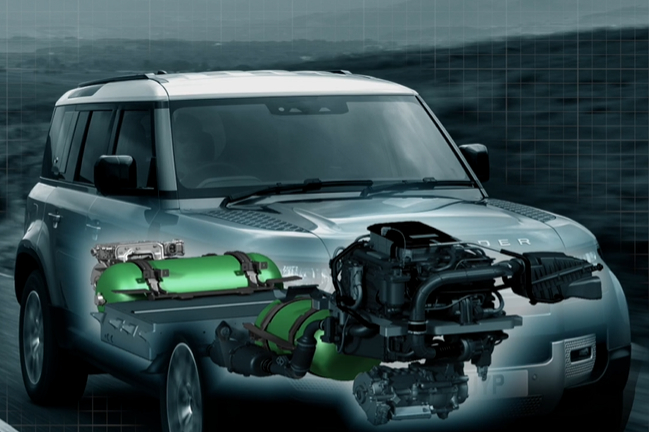Jaguar Land Rover to develop hydrogen fuel cell electric vehicle prototype
Based off the new Land Rover Defender, the FCEV concept will be a zero tailpipe emissions prototype, with testing scheduled for late 2021.
Share

Photo Credit: Jaguar Land Rover (JLR)
Jaguar Land Rover (JLR, Coventry, U.K.) announced on June 15 that it is developing a prototype hydrogen fuel cell electric vehicle (FCEV) based on the new Land Rover Defender, with testing scheduled to begin later this year. Material use is not stated, but composites may have a part to play in the vehicle’s development, which is further emphasized by company’s four-year Tuscana project announced in February to develop lightweight structures using carbon and glass fiber.
The FCEV concept is part of Jaguar Land Rover’s aim to achieve zero tailpipe emissions by 2036, and net-zero carbon emissions across its supply chain, products and operations by 2039, in line with the Reimagine strategy announced last month. This strategy acknowledges the company’s “sustainability-rich reimagination of modern luxury, unique customer experiences, and positive societal impact,” which includes the launch of six pure electric variants in the next five years.
FCEVs, JRL says, which generate electricity from hydrogen to power an electric motor, are complimentary to battery electric vehicles (BEVs) on the journey to net-zero vehicle emissions. Hydrogen-powered FCEVs provide high energy density and rapid refueling, and minimal loss of range in low temperatures, making the technology ideal for larger, longer-range vehicles, or those operated in hot or cold environments.
According to the International Energy Agency (IEA), since 2018, the global number of FCEVs on the road has nearly doubled while hydrogen refueling stations have increased by more than 20%. By 2030, Hydrogen Council forecasts predict hydrogen-powered FCEV deployment could top 10 million with 10,000 refueling stations worldwide.
JLR’s advanced engineering project, known as Project Zeus, is partly funded by the government-backed Advanced Propulsion Centre (Coventry, U.K.), and will allow engineers to understand how a hydrogen powertrain can be optimized to deliver the performance and capability expected by its customers, from range to refueling, and towing to off-road ability. To deliver the project, JLR has teamed up with R&D partners Delta Motorsport, AVL, Marelli Automotive Systems and the UK Battery Industrialisation Centre (UKBIC) to research, develop and create the prototype FCEV.
The zero tailpipe emission prototype Defender FCEV will begin testing towards the end of 2021 in the U.K. to verify key attributes such as off-road capability and fuel consumption.
“We know hydrogen has a role to play in the future powertrain mix across the whole transport industry, and alongside battery electric vehicles, it offers another zero-tailpipe emission solution for the specific capabilities and requirements of Jaguar Land Rover’s world-class lineup of vehicles,” says Ralph Clague, head of Hydrogen and Fuel Cells, Jaguar Land Rover. “The work done alongside our partners in Project Zeus will help us on our journey to become a net-zero carbon business by 2039, as we prepare for the next generation of zero tailpipe emissions vehicle.”
Related Content
-
Composites end markets: Automotive (2024)
Recent trends in automotive composites include new materials and developments for battery electric vehicles, hydrogen fuel cell technologies, and recycled and bio-based materials.
-
“Structured air” TPS safeguards composite structures
Powered by an 85% air/15% pure polyimide aerogel, Blueshift’s novel material system protects structures during transient thermal events from -200°C to beyond 2400°C for rockets, battery boxes and more.
-
TPI manufactures all-composite Kenworth SuperTruck 2 cab
Class 8 diesel truck, now with a 20% lighter cab, achieves 136% freight efficiency improvement.
















